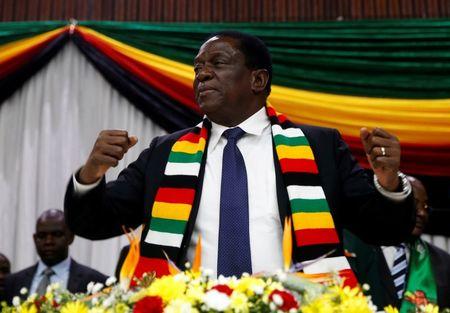By Jeph Ajobaju, Chief Copy Editor
Zimbabwe is optimistic of its return to the warmth of international relations, especially with the West, now that violence over hiked fuel prices has mellowed and there is a $600 million loan from Botswana.
News of the succour from the neighbouring country broke on February 26 after South Africa had in January rejected Zimbabwe’s request for a $1.2 billion loan to revive an economy run aground by bad governance.
But on March 4, United States President Donald Trump extended by one year sanctions against Zimbabwe, saying the policies of the administration of President Emmerson Mnangagwa still posed an “unusual and extraordinary” threat to American foreign policy.
Harare said on March 6 that the extension was regrettable but it would keep talking to Washington and the European Union (EU) to remove the measures that have stifled its economy, according to Reuters.
Crippling effects of sanctions
Zimbabwe has been affected by the sanctions imposed by the U.S. and the EU since the early 2000s over violations of human rights and democratic norms under Robert Mugabe’s rule of 37 years.
The West accused Mugabe of rigging elections, rights abuses and oppressing opponents before he was ousted after a coup in 2017.
The sanctions led to the collapse of foreign loans and investments in the economy, but the situation started to change in November 2017, when Mnangagwa became president.
However, there was a military crackdown on ordinary citizens and members of opposition parties who protested against his victory in the presidential election in August 2018.
That coupled with the violence two months ago and the battering of political opponents bolstered the case for case for Zimbabwe to retain its pariah status.
Observers cited both cases as stark indications that Zimbabwe is reverting to the authoritarian rule of the Mugabe era.
Reuters reports that the renewal of U.S. comes despite calls by African leaders, like South Africa’s President Cyril Ramaphosa, for the sanctions to be lifted to give the country a chance to recover from its economic crisis.
Zimbabwean Foreign Ministry Secretary, James Manzou, told a committee of Parliament that the sanctions were unwarranted.
“While these (sanctions) regrettably remain in place, the ministry believes the new dispensation has laid a firm foundation for future relations with the United States,” Manzou said.
There are 141 entities and individuals in Zimbabwe, including Mnangagwa and Mugabe, under U.S. sanctions.
The sanctions bar U.S. officials from voting for Zimbabwe to access funds from foreign lenders like the International Monetary Fund (IMF) and the World Bank, hobbling its economy gripped by a severe shortage of dollars.
With high inflation and a shortage of cash in circulation eroding ordinary citizens’ spending power, the fragile state of the economy is at the heart of the country’s political troubles.
Manzou stressed, however, that the government was not giving up on mending ties with the West and had in February started informal dialogue with the EU in Harare, a precursor to formal talks that could see the country receive budgetary support in future.
The EU has retained sanctions on Mugabe, his wife, and arms supplier Zimbabwe Defence Industries as well as an arms embargo on Zimbabwe.
Manzou blamed this on “hawks within the EU bloc”.
He said Zimbabwe was on course with plans to rejoin the Commonwealth, which plans to send a fact-finding team to Harare in the first half of this year as part of steps to readmit Zimbabwe, which left the group in 2003.
Lifeline from Botswana
In another sign of hope, state-owned newspaper Herald reported on February 26 that Botswana had offered to lend Zimbabwe $600 million to support its diamond industry and local private firms, amid a severe dollar crunch.
The flow of foreign currency is not improving in Zimbabwe after it ditched a discredited 1:1 dollar peg for its dollar-surrogate bond notes and electronic dollars, merging them into a lower-value transitional currency called the RTGS dollar.
The loan consists of $500 million for Zimbabwe’s diamond industry and a further $100 million to help private companies, whose operations have been hamstrung by the dollar shortage.
“Zimbabwe is also appreciative of the $500 million diamond facility offered to it by Botswana,” Herald quoted Manzou as saying.
The diamond sector has struggled since the government kicked out private companies from the eastern Marange fields in early 2016 after they declined to merge under the state-owned mining company.
Relations between Zimbabwe and Botswana have improved recently following a strained period when Botswana’s former President Ian Khama, who stepped down in 2018, routinely criticised Mugabe for holding on to power for too long.
$100m as first UK loan in 24 years
Last year, the United Kingdom provided the first commercial loan to the Zimbabwean private sector since 1994.
The Financial Times reported that the CDC Group development institution, owned by the UK Government and the Standard Chartered Bank, would lend $100 million to Zimbabwean companies.
“This is a significant move, in that it is a medium-term facility to be used for the revival of companies in Zimbabwe,” said John Mangudya, Governor of Reserve Bank of Zimbabwe.
“There has been a deficit of medium-term funding, which was not forthcoming to Zimbabwe.
“This is going to improve the competitiveness of the industry in Zimbabwe in terms of retooling and improvement of productivity.”
Nick O’Donohoe, CEO of the CDC Group, recalled that the last direct loan provided by the institution to Zimbabwe was in 1994, given to a fish farm.











